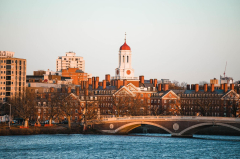
Teaching hospitals, state attorneys general, Harvard alumni and more universities have filed briefs … More in support of Harvard’s lawsuit against the Trump administration’s funding freeze.
Several more parties have announced their support for Harvard University’s lawsuit against the Trump administration’s freeze affecting more than $2 billion in federal grant money.
Last week, 18 of the nation’s leading research universities requested that a federal judge allow them to file a legal brief supporting Harvard’s lawsuit to recover the funding being withheld by the Trump administration. That request was granted.
Now, several more institutions, higher education organizations and coalitions — including teaching hospitals, Harvard alums, and state attorneys general — are coming forward to file amicus curiae (or “friend of the court”) briefs in support of the nation’s oldest and wealthiest university.
Here’s a quick summary of four of the more noteworthy filings.
Research Universities
Six more institutions joined the original 18 universities that asked Judge Allison D. Burroughs, who’s presiding over the federal lawsuit, to allow them to file an amicus brief.
On Monday, that coalition filed a 19-page amicus brief, laying out how funding cuts for scientific research endangers a “longstanding, mutually beneficial arrangement between universities and the American public. Terminating funding disrupts ongoing projects, ruins experiments and datasets, destroys the careers of aspiring scientists, and deters investment in the long-term research that only the academy—with federal funding—can pursue, threatening the pace of progress and undermining American leadership in the process.”
Signing the brief were: American University; Boston University; Brown University; California Institute of Technology; Colorado State University; Dartmouth College; Georgetown University; Johns Hopkins University; Massachusetts Institute of Technology; Michigan State University; Oregon State University; Princeton University; Rice University; Rutgers University; Stanford University; Tufts University; University of Delaware; University of Denver; University of Maryland, Baltimore; University of Maryland, College Park; University of Oregon; University of Pennsylvania; University of Pittsburgh; and Yale University.
Attorneys General
Also on Monday, a group of 21 attorneys general filed an amicus brief in support of a summary judgment in Harvard’s favor. They argue that, in addition to endangering Harvard’s research, the funding freeze threatens the economies and health of their states.
Massachusetts, California, Colorado, Connecticut, Delaware, the District of Columbia, Hawai‘i, Illinois, Maine, Maryland, Michigan, Minnesota, Nevada, New Jersey, New Mexico, New York, Oregon, Rhode Island, Vermont, Washington and Wisconsin were the amici states filing the brief.
They wrote that, “beyond threatening current jobs and businesses, such a freeze would halt career development for promising new scientists and debilitate the pipeline for future innovators in Amici States. It would also prevent research into lifesaving medicines and transformative technologies with potential to improve the health and life of Amici State residents. In short, the federal government’s current attack on research universities is,





